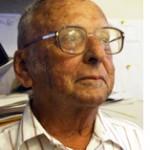Editor’s Note: Author Sheila Isenberg will speak as part of the Book Fair at Temple Solel, 3575 Manchester Avenue, Cardiff, at 2 p.m. on Sunday, Nov 14.
*
Muriel’s War by Sheila Isenberg; Palgrave Macmillan; 256 pages; $26.
By Norman Manson

SAN DIEGO–World War II, with all its varied ramifications, has spawned a vast variety of stories, some depicting heroism, others cold-blooded evil, and some have just recently come to light, or least put into print.
The life of Muriel Gardner certainly belongs in the latter category. Her story is truly heartwarming – the number of lives she saved, or at least had a hand in saving, was incredibly great. And the saga of her long, adventurous life makes thoroughly fascinating reading.
Muriel was the scion of two very wealthy families, both of whom made their money in the heyday of Chicago’s meatpacking industry, a product of the Gilded Age. Her father was a non-observant Jew, her mother a Protestant. With her millions in inherited wealth, she was able to travel widely, buy just about any property she fancied, and most of all, give help to the needy, especially to those fleeing the nazi war machine in the late 1930s and early 40s.
Early on, she began to eschew the standard rich-girl role and quickly became a maverick, involved in such causes as women’s suffrage and aiding those living in poverty. During her days at Wellesley College, her political and ideological views moved steadily to the left, heavily influenced by the notorious Sacco-Vanzetti murder case, and she became active in several liberal, even radical student groups.
After graduation, she headed for Europe, first to Rome, then to Oxford and, finally, in 1926 to Vienna, which would be her home until shortly after Hitler’s forces swept into Austria in the Anschluss of 1938. And it was there that she joined the Socialist party, which was a dangerous move even before the Anschluss – Austria was dominated by Fascism through most of the 30s, and Socialists and other leftists were being persecuted even then.
Although she also was studying medicine, and eventually became a noted psychiatrist, most of her energies were devoted to helping those trying to flee. As an American, she was relatively immune from persecution, and was able to get the refugees false passports, hide them in her various residences and help them financially. Many survived, but a few did not. And getting them to safety took a large measure of guile and subterfuge.
She had several love affairs, including two short-lived marriages – one of which resulted in the birth of her only child – before meeting the love of her life, Joe Buttinger, a fellow Socialist activist. They were lovers for several years before marrying in Paris in 1939 after they fled nazi-occupied Austria. She and her new husband returned to the U.S. aboard the last ocean liner that crossed the Atlantic from France after the outbreak of World War II.
Even after returning to the U.S., she remained active in aiding Jews and others to escape the nazis and, later, to help Holocaust survivors to cope with their new situation. After the war, she turned to psychiatry, and held several major positions. She also wrote three books on the subject. She remained active into her 80s, before dying of lung cancer in 1985.
Biographer Sheila Isenberg delves quite deeply into Muriel’s personality, drawing on Muriel’s own writings and the recollections of her wide circle of acquaintances. Unfortunately, the book is not annotated and there are no notes regarding sources. Also, a few photos would have fleshed out the story. But the narrative tells not only a detailed story of her life, but also adds greatly to our knowledge of life in Europe as events marched inexorably toward the catastrophe of World War II.
*
Manson is a freelance writer based in San Diego